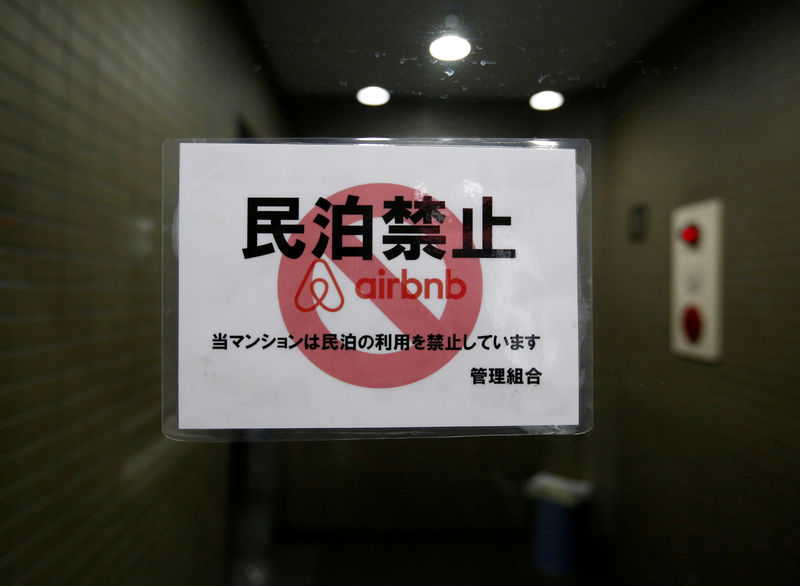 © Reuters. FILE PHOTO: A sign communicating the ban on using the apartment building as Airbnb service by the building management is attached to the building’s front door in Tokyo, Japan
© Reuters. FILE PHOTO: A sign communicating the ban on using the apartment building as Airbnb service by the building management is attached to the building’s front door in Tokyo, JapanTOKYO (Reuters) – Japan’s sharing economy made up less than a 10th of a percent of nominal gross domestic product in 2016, research showed on Wednesday, in a sign the sector remains very much in its infancy.
The sharing economy – using technology to allow consumers and businesses to directly trade goods and services – has threatened to upend business models for industries including taxis, hotels, and consumer finance.
Policymakers in many countries are starting to question how to measure the economic impact of this technological change, but research published by the Japanese government and Mitsubishi Research Institute showed this impact is small in the world’s third-largest economy.
Some of the country’s business leaders have criticized Japan’s slow adoption of innovative technology and warned the country was lagging overseas rivals in areas such as artificial intelligence.
“Ride-sharing is prohibited by law in Japan. I can’t believe there is still such a stupid country,” SoftBank Group Corp’s (T:) chief executive Masayoshi Son, said an annual company event last week.
Japan’s sharing economy was around 255 billion yen ($2.3 billion) in 2016, the research showed. Of this figure, some 120 billion yen was reflected in the country’s GDP calculations, but around 135 billion yen was not captured in GDP.
In comparison, nominal GDP stood at 538 trillion yen in 2016.
The government will consider changes to existing data and calculation methods to reflect more of the sharing economy in GDP, but it may take time to reach a conclusion, an official told reporters at a news briefing.
Japanese regulators have so far taken a cautious approach to companies that typify the sharing economy, so there are doubts about how much this sector can grow in Japan.
Japan outlaws non-professional drivers from transporting paying customers due to safety concerns and the country’s taxi industry lobby has vigorously opposed deregulation.
Its strict rules have confined ride-sharing firms such as Uber [UBER.UL] to providing only very limited services.
New rules on home-sharing came into force last month that have radically reduced the number of lettings on sites such as Airbnb Inc, which allows people to rent out rooms or entire apartments.
Japan’s Mercari Inc (T:) made a splash last month when the flea market operator raised $1.2 billion in the country’s largest initial public offering this year.
Mercari’s popular mobile phone application allows individuals to buy and sell used goods from each other, which is commonly considered part of the sharing economy.
However, this is not measured in GDP because no new goods are being created, the government official told reporters.
The report divided the sharing economy into companies that focus on lodging and space, transportation, exchange of newly-created goods, exchange of services, and fundraising.
Fusion Media or anyone involved with Fusion Media will not accept any liability for loss or damage as a result of reliance on the information including data, quotes, charts and buy/sell signals contained within this website. Please be fully informed regarding the risks and costs associated with trading the financial markets, it is one of the riskiest investment forms possible.
Source: Investing.com





























